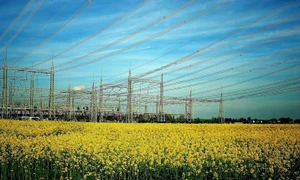
(Photo: Wesley Overklift/LKAB)
This week, the European Parliament gave the green light for new rules to ensure the EU increased extraction and supply of strategic raw materials.
Through the law, the EU will make it easier to open new mines, or strategic projects, which are considered especially important, among other things. The aim is to ensure Europe's greater supply of critical raw materials, which are crucial to the union's green and digital shift.
The new law includes economic incentives and a more stable and secure business framework for mining and recycling projects – with quicker and easier authorisation procedures.
Easier authorisation procedures
"This legislation is an industrial policy blueprint for a secure and sustainable supply of raw materials in Europe," says Nicola Beer, Lead MEP (Member of the European Parliament), in a press release.
"With targeted economic incentives, we are creating project-planning certainty for private investors - through single points of contact for companies, and fast and simple authorisation procedures with clear deadlines for national authorities. This will boost mining, processing and recycling in Europe," she adds.
LKAB positive to new rules
The backdrop for the new legislation is the global shift toward renewable energy of digitization of economies and societies. Electric cars, solar panels, and smartphones all contain critical raw materials and the demand for these will increase in the coming years.
Critical raw materials are pivotal for the EU's green and digital transitions, and securing their supply is crucial for the European Union's economic resilience, technological leadership, and strategic autonomy," reads the press release.
In Northern Sweden, the Swedish state mining company LKAB is positive to shorter permit processes, which the new legislation entails, according to the Swedish radio channel P4.
Major mineral deposits in Northern Sweden
LKAB operates several iron ore mines in Sweden's northernmost region and also invests big in the production and processing of minerals.
In January this year, the mining company announced that they had made great discoveries of rare earth mineral resources in the Northern Swedish town of Kiruna. According to LKAB, the deposit has the potential of becoming Europe's most important mine for critical raw materials.
The company's mining operations take place in the immediate vicinity of what is the world's largest underground mine for iron ore.
LKAB CEO Jan Moström specified in connection with the finding that a fossil free future requires six times greater production of minerals in 2040 than today. He also highlighted that the EU uses 30 percent of the global metals and minerals, but only 3 percent of these are extracted in the union.
The law in question, named the Critical Raw Materials Act, must be formally approved by the EU Council before it can enter into force.
This week, the European Parliament gave the green light for new rules to ensure the EU increased extraction and supply of strategic raw materials.
Through the law, the EU will make it easier to open new mines, or strategic projects, which are considered especially important, among other things. The aim is to ensure Europe's greater supply of critical raw materials, which are crucial to the union's green and digital shift.
The new law includes economic incentives and a more stable and secure business framework for mining and recycling projects – with quicker and easier authorisation procedures.
Easier authorisation procedures
"This legislation is an industrial policy blueprint for a secure and sustainable supply of raw materials in Europe," says Nicola Beer, Lead MEP (Member of the European Parliament), in a press release.
"With targeted economic incentives, we are creating project-planning certainty for private investors - through single points of contact for companies, and fast and simple authorisation procedures with clear deadlines for national authorities. This will boost mining, processing and recycling in Europe," she adds.
LKAB positive to new rules
The backdrop for the new legislation is the global shift toward renewable energy of digitization of economies and societies. Electric cars, solar panels, and smartphones all contain critical raw materials and the demand for these will increase in the coming years.
Critical raw materials are pivotal for the EU's green and digital transitions, and securing their supply is crucial for the European Union's economic resilience, technological leadership, and strategic autonomy," reads the press release.
In Northern Sweden, the Swedish state mining company LKAB is positive to shorter permit processes, which the new legislation entails, according to the Swedish radio channel P4.
Major mineral deposits in Northern Sweden
LKAB operates several iron ore mines in Sweden's northernmost region and also invests big in the production and processing of minerals.
In January this year, the mining company announced that they had made great discoveries of rare earth mineral resources in the Northern Swedish town of Kiruna. According to LKAB, the deposit has the potential of becoming Europe's most important mine for critical raw materials.
The company's mining operations take place in the immediate vicinity of what is the world's largest underground mine for iron ore.
LKAB CEO Jan Moström specified in connection with the finding that a fossil free future requires six times greater production of minerals in 2040 than today. He also highlighted that the EU uses 30 percent of the global metals and minerals, but only 3 percent of these are extracted in the union.
The law in question, named the Critical Raw Materials Act, must be formally approved by the EU Council before it can enter into force.























